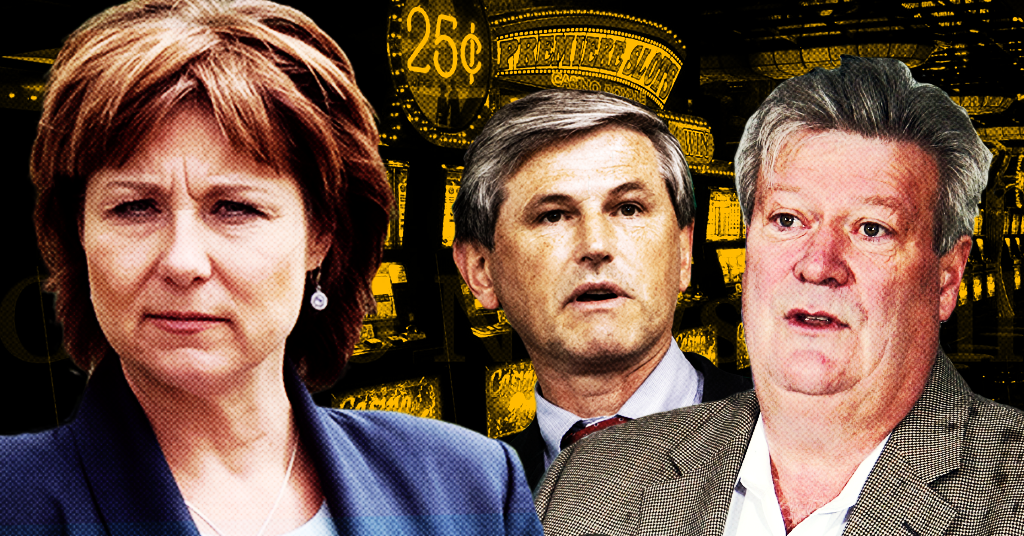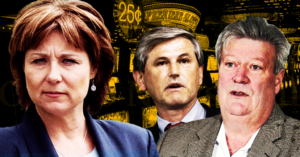
Here’s What We Know So Far About Criminal Money Laundering During The BC Liberals’ 16 Years in Power
The BC Liberals ignored warnings about money laundering for years
British Columbia is getting ready to launch a public inquiry into billions of dollars in dirty money laundered throughout the province for decades.
Opening statements are scheduled to begin next month following multiple reports since 2018 revealing the old BC Liberal government turned a blind eye to warnings about the far-reaching scope of criminal money laundering in the province.
Here’s what we know about dirty money during the BC Liberals’ 16 years in power:
Dirty money in BC casinos
According to a 2018 report by former RCMP investigator Peter German, gangs used the proceeds of criminal activities, such as drug dealing, to loan cash to gamblers or low-level gang members.
Those surrogates then paid for casino chips with twenty-dollar bills, before quickly cashing out the chips — making the money appear as though it came from a legitimate source.
German told the Globe and Mail that, in 2015, investigators discovered cash buy-ins at one casino totalled $13.5 million, almost entirely paid for in twenty-dollar bills: “the preferred currency of drug traffickers.”
However, despite receiving warnings about money laundering and its links to horrific criminal activities in a 2009 RCMP report, the BC Liberals defunded a police unit tasked with fighting illegal gaming activities.
According to German, the BC Liberals received further warnings about money laundering in BC’s casinos in:
- A 2011 internal provincial report.
- A 2012 document prepared by the province’s gambling watchdog, Gaming Policy and Enforcement Branch (GPEB), which warned of “suspicious cash increasing at an alarming rate” in casinos.
- A 2015 internal report warning about the suspicious $13.5 million cash buy-in at Richmond’s River Rock Casino.
In fact, in late 2013 former BC Liberal finance minister Mike de Jong increased betting limits betting limits in BC Lottery Corp casinos, despite warnings about money laundering from the province’s gambling regulator.
Last year, BC’s Attorney General David Eby estimated a total of up to $1 billion was laundered per year through BC’s legal and illegal casinos.
Incidentally, the BC Liberals received more than $300,000 in political donations from two “dirty money” casino operators named in German’s report ahead of the 2017 provincial election.
Dirty money in BC’s real estate market
Last year, the BC government’s Expert Panel on Money Laundering in BC Real Estate report found $5 billion is laundered through BC’s real estate sector every year, increasing average property prices in the province by 5%.
As previously reported, before the current BC government introduced legislation forcing property buyers to disclose their true identities, buyers could purchase real estate anonymously.
That loophole allowed criminals to funnel their money through shell companies, often set up in tax havens like the Seychelles or the British Virgin Islands. The report noted criminals favour real estate because it typically doesn’t depreciate much in value.
And, because criminals are typically seeking to quickly launder large sums of cash, they can easily outbid other would-be buyers by offering to pay hugely inflated prices for real estate.
This factor drove up average property prices, worsening BC’s housing affordability crisis.
Dirty money in BC’s luxury car dealerships
Criminal gangs also laundered money through BC’s luxury car market.
According to German’s third money-laundering report, published last year, criminals hired “straw buyers” using cash or unidentifiable bank drafts to buy expensive cars, which were typically resold abroad. German’s report noted salespeople are not required to report suspicious transactions to the Financial Transactions and Reports Analysis Centre of Canada (FINTRAC).
To add insult to injury, a loophole in BC’s tax code in BC’s tax code meant gangsters could apply for Provincial Sales Tax (PST) rebates after exporting the vehicles.
German said applications for PST rebates on luxury vehicles jumped from fewer than 100 per year prior to 2014, to 700 in 2015, and then to 3,674 in 2016 and 4,452 in 2018.
Despite the suspiciously large increases in PST rebate applications, the old BC Liberal government failed to take action.
Our journalism is powered by readers like you.
We’re an award-winning non-profit news organization that covers topics like social and economic inequality, big business and labour, and right-wing extremism.
Help us build so we can bring to light stories that don’t get the attention they deserve from Canada’s big corporate media outlets.
Donate



